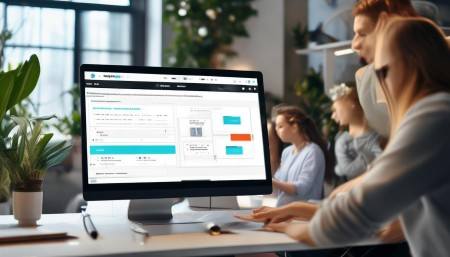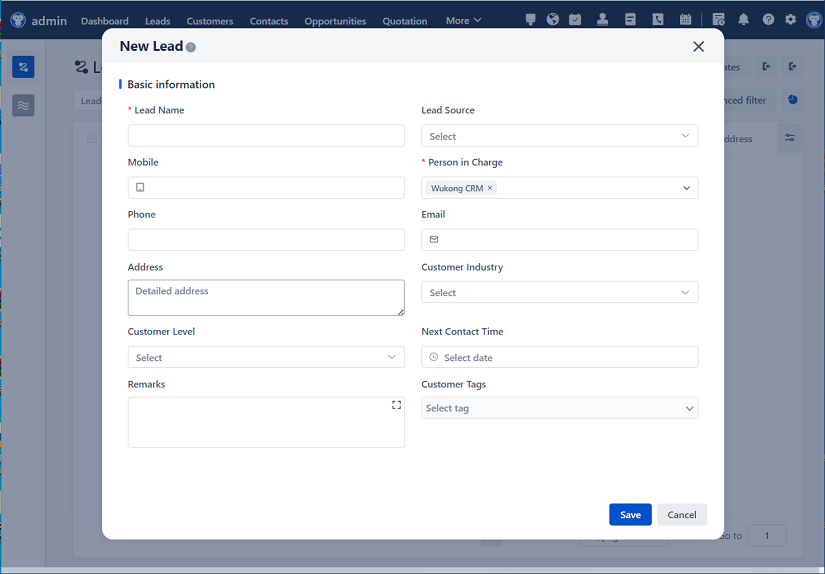
△Click on the top right corner to try Wukong CRM for free
You know, running a small business is no small feat. I mean, think about it — you're juggling everything from sales and marketing to customer service and maybe even product development, all with a tiny team or maybe even solo. It’s exhausting, right? And one of the biggest headaches I’ve seen — and honestly, experienced myself — is keeping track of customers. You meet someone at a networking event, they seem interested, you follow up… and then what? They vanish into your inbox or, worse, into a sticky note on your monitor that you lose by Tuesday.
That’s where a CRM — a Customer Relationship Management system — comes in. But here’s the thing: when you hear “CRM,” your mind probably jumps to those big, clunky enterprise systems that cost a fortune and need a whole IT department to run. Yeah, those exist. But honestly? They’re overkill for most small businesses. What we really need — what I needed — is something lightweight, simple, and actually useful without turning into a full-time job.

So let me tell you about lightweight CRM systems. These are tools designed specifically for small teams or solopreneurs who want to stay organized without drowning in complexity. They’re usually cloud-based, easy to set up, and — this is key — they don’t require weeks of training to use. I remember trying one of those big-name CRMs a few years ago. I spent two days just trying to figure out how to import my contacts. By the time I got it working, the customer had already bought from someone else.

Lightweight CRMs are different. They get straight to the point. Most of them let you log customer interactions, track leads, set reminders, and even automate follow-ups — all in a clean, intuitive interface. And the best part? A lot of them are either free or cost less than your monthly coffee budget. I’m talking
One of the first lightweight CRMs I tried was HubSpot’s free version. Honestly, I was skeptical at first. Free? What’s the catch? But here’s the thing — it actually works. You can manage contacts, track deals, and even send basic emails through the platform. It’s not perfect — the free version has limits, sure — but for a small business just starting out, it’s a game-changer. I was able to organize my entire client list in under an hour. No spreadsheets, no messy notes — just a clean database I could actually use.
And you know what surprised me? How much better my follow-up game became. Before, I’d remember someone vaguely — “Oh yeah, that guy from the conference” — and have to dig through emails to figure out what we talked about. Now, with a lightweight CRM, I can see the whole history: when we first connected, what they were interested in, the last email I sent, and even notes from a phone call. It makes me look way more professional, even if I’m just a one-person shop.
Another one I’ve been using lately is Zoho CRM’s free tier. It’s super flexible and integrates well with Gmail and Google Calendar, which is huge for me because I live in my inbox. I can log an email as a customer interaction with one click. I can set tasks and reminders that pop up right in my calendar. It’s like having a tiny assistant who never sleeps.
And don’t even get me started on mobile access. Most of these lightweight CRMs have solid mobile apps. So if I’m out meeting a client and I want to jot down a quick note, I can do it right then and there. No more “I’ll remember this later” — which we all know is a lie. The app syncs instantly, so everything’s up to date across devices. That kind of real-time access? It’s not just convenient — it’s essential.
Now, I know what some of you might be thinking: “But I don’t have time to learn a new tool.” I get it. Trust me, I’ve been there. But here’s the truth — these systems are built for people like us. They’re designed to save time, not waste it. Most take less than 30 minutes to set up. You import your contacts, add a few custom fields if you want, and boom — you’re ready to go. And the time you save in the long run? It pays for itself ten times over.
Let’s talk about automation for a second. That word can sound scary, like robots taking over your job. But in a lightweight CRM, automation is actually super helpful and totally manageable. For example, I set up a simple workflow that sends a follow-up email three days after someone downloads my free guide. It’s not fancy, but it keeps me top of mind without me having to remember to do it manually. And guess what? I’ve closed a few sales just because of that one automated email.
Another thing I love about these systems is how they help with sales tracking. Before, I had no idea where my leads were stalling. Were people not responding to emails? Were they dropping off after a demo? With a lightweight CRM, I can actually see the pipeline. I can tell at a glance how many leads I have, where they are in the process, and what I need to do next. It’s like turning guesswork into strategy.
And here’s a little secret — using a CRM doesn’t just help you sell more. It helps you serve better. When a customer reaches out with a question, I can pull up their history instantly. I know what they’ve bought, what they’ve asked about, and even what they complained about last time. That level of personalization? It builds trust. People notice when you remember them. It makes them feel valued — and that’s how you turn one-time buyers into loyal fans.
I should also mention integrations. Most lightweight CRMs play nicely with other tools you’re probably already using — like email marketing platforms, calendars, and even accounting software. For example, I use Mailchimp for newsletters, and my CRM syncs contact lists automatically. No more copying and pasting. It just works. And when tools talk to each other, your whole workflow gets smoother.
Now, not all lightweight CRMs are the same. Some are better for sales-heavy businesses, others for service-based ones. For instance, if you’re a consultant or coach, you might want something like Streak, which lives right inside Gmail. It’s minimal, unobtrusive, and perfect if you don’t want to switch between apps. On the other hand, if you’re doing e-commerce or have a bigger team, you might lean toward something like Insightly or Agile CRM, which offer more features but still stay user-friendly.
Pricing is another thing to consider. Most of these tools use a freemium model — free for basic features, then paid tiers as you grow. That’s great because you can start small and scale up only when you need to. I started with HubSpot’s free plan, and only upgraded when I hit the contact limit. By then, the CRM had already helped me bring in enough new business to justify the cost.
Security is always a concern, especially when you’re storing customer data. But honestly, most reputable lightweight CRMs take security seriously. They use encryption, regular backups, and compliance with privacy laws like GDPR. It’s way safer than keeping everything in an unsecured spreadsheet on your laptop, which — let’s be real — is what a lot of small businesses do.
One thing I’ve learned is that consistency matters more than perfection. You don’t have to log every single interaction perfectly. Just start. Add your current clients. Track your next follow-up. Get into the habit of opening the CRM when you check your email. Over time, it becomes second nature. And the more you use it, the more value you get.
And hey — if you mess up or forget to update something, it’s not the end of the world. These systems are meant to help, not stress you out. The goal isn’t to build a perfect database — it’s to build better relationships. That’s what CRM really stands for, in my opinion: Connecting Real Moments.
So if you’re a small business owner still managing customers in spreadsheets, sticky notes, or — gasp — your memory, I really encourage you to give a lightweight CRM a try. Start with the free version of one of the popular ones. Spend an hour setting it up. Import your contacts. Play around with it. See how it feels.
You might be surprised at how much smoother things run. I was. I used to spend hours every week chasing down information or trying to remember who I needed to follow up with. Now, my CRM does most of that for me. I have more time to focus on actual work — the kind that grows my business.
At the end of the day, a lightweight CRM isn’t just a tool. It’s a force multiplier. It helps you do more with less — less time, less stress, fewer missed opportunities. And for a small business, that’s everything.
FAQs (Frequently Asked Questions)
Q: Do I really need a CRM if I only have a few clients?
A: Honestly, even if you only have five clients, a CRM can help. It keeps everything organized so you don’t miss a follow-up or forget important details. Think of it as future-proofing your business.
Q: Are lightweight CRMs secure?
A: Most reputable ones use strong encryption and follow data protection standards. They’re usually way safer than storing info in spreadsheets or email drafts.
Q: Can I switch CRMs later if I outgrow one?
A: Yes! Most platforms let you export your data easily. Start simple, and move to a more advanced system when you need it.
Q: How long does it take to set up a lightweight CRM?
A: Usually less than an hour. Import contacts, customize a few fields, and you’re good to go. Some even have setup wizards to guide you.

Q: Will a CRM help me close more sales?
A: Absolutely. By tracking leads and automating follow-ups, you’ll stay on top of opportunities you might otherwise forget.
Q: What if I’m not tech-savvy?
A: Don’t worry — these tools are built for non-techies. They’re intuitive, with simple interfaces and great customer support.
Q: Can I access my CRM on my phone?
A: Yes, most have mobile apps so you can update records or check tasks on the go.
Q: Is the free version enough for a small business?
A: For many, yes. Free versions often include core features like contact management and basic automation — perfect for getting started.
Related links:
Free trial of CRM
Understand CRM software
AI CRM Systems

△Click on the top right corner to try Wukong CRM for free